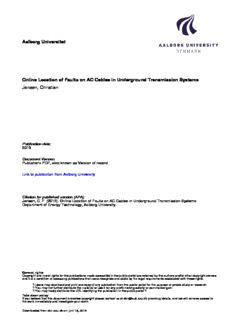
Online Location of Faults on AC Cables in Underground Transmission Systems PDF
Preview Online Location of Faults on AC Cables in Underground Transmission Systems
Aalborg Universitet Online Location of Faults on AC Cables in Underground Transmission Systems Jensen, Christian Flytkjær Publication date: 2013 Document Version Publisher's PDF, also known as Version of record Link to publication from Aalborg University Citation for published version (APA): Jensen, C. F. (2013). Online Location of Faults on AC Cables in Underground Transmission Systems. Department of Energy Technology, Aalborg University. General rights Copyright and moral rights for the publications made accessible in the public portal are retained by the authors and/or other copyright owners and it is a condition of accessing publications that users recognise and abide by the legal requirements associated with these rights. ? Users may download and print one copy of any publication from the public portal for the purpose of private study or research. ? You may not further distribute the material or use it for any profit-making activity or commercial gain ? You may freely distribute the URL identifying the publication in the public portal ? Take down policy If you believe that this document breaches copyright please contact us at [email protected] providing details, and we will remove access to the work immediately and investigate your claim. Downloaded from vbn.aau.dk on: marts 27, 2019 July2013 xx Online Location of Faults on AC Cables in Underground Transmission Systems xx ChristianFlytkjærJensen Energinet.dk&AalborgUniversity email: [email protected] ONLINE LOCATION OF FAULTS ON AC CABLES IN UNDERGROUND TRANSMISSION SYSTEMS by ChristianFlytkjærJensen DissertationsubmittedtotheFacultyofEngineering,ScienceandMedicineat AalborgUniversityinpartialfulfilmentoftherequirementsforthedegreeof DoctorofPhilosophyinElectricalEngineering DepartmentofEnergyTechnology AalborgUniversity,Denmark July2013 Preface This thesis is submitted to the Faculty of Engineering, Science and Medicine at Aalborg University in partial fulfilment of the requirements for the PhD degree in Electrical Engi- neering. Theresearchhasbeencarriedoutbetweenthe1.09.2010andthe15.07.2013atthe DepartmentofEnergyTechnologyforEnerginet.dkbywhichIwashiredasaPhD-student fortheentireprojectperiod. The project has been followed full time by two supervisors: Professor Claus Leth Bak (DepartmentofEnergyTechnology)andDr. UnnurStellaGudmundsdottir(Energinet.dk). Energinet.dkhasfullyfundedtheresearchleadingtothisthesis”OnlineLocationofFaults onACCablesinUndergroundTransmissionSystems”. Thisfundinghasbeenvitalforthis researchproject. Travellingtoconferences,twovisitsatforgingresearchinstitutions,rent- ingoflaboratoryequipmentandperformanceofandfieldmeasurementswasmadepossible thankstosupportfromthecompany. IspendtheperiodfromApriltoJune2013atNortheasterUniversityinBoston,USA,under thesupervisionofProfessorAliAbur. Here,iworkedontwoIEEEtransactionpaperswith oneofthemco-authoredbyProfessorAbur. InSeptember2013ispendonemonthattheManitobaHVDCResearchCentreinWinnipeg working on fault location on hybrid lines and analysing my field measurements. During this stay I corroborated with PhD-student K. Nanayakkara and Professor A. D. Rajapakse bothfromthedept. ofElectricalandComputerEngineerUniversityofManitoba,Winnipeg Canada. DuringtheprojetperiodIsupervisedtwomasterprojectsandthoughtonesemestercourse inpowersystemtransients. ThescientificpaperswrittenasapartofthisPhDareincludedinthebackofboththeprinted versionofthethesisaswellasinthePDF-file. Thepapersshouldnotbeconsideredapart ofthismonograph,butareenclosedifthereaderisinterested. This thesis has five parts and appendices. An overall literature reference list is presented at the end of the main report. A list of the authored publications is presented at the end of the thesis. Literature references are shown as [i], where i is the number of the literature in the reference list. Tables, figures and equations are shown as C.F, where C is the chapter numberandFisauniquenumberforthefigureortable. Acknowledgements Iowegratitudetomanypeoplewhohelpedmeindifferentways. Iwouldliketothank: • Mysupervisors,ClausLethBakandUnnurStellaGudmundsdottirforalltheirhelp, comments,andmanytechnicaldiscussionsduringthelastthreeyears. • Carl-ErikMadsen,HenrikKastbergandCarlWilliHansenfortheirhelpwithcarrying outthefieldmeasurements. Inthesameregards,averyspecialthanksisextendedto Filipe Faria da Silva and Unnur Stella Gudmundsdottir for participating during all measurements. • FilipeFariadaSilvafornumeroustechnicaldiscussions,forreadinglargepartsofthe thesisandformanygoodtimesintheoffice. • Rasmus Schmidt Olsen, Unnur Stella Gudmundsdottir, Joachim Holbøll, Per Balle Holst, PoulErikPedersen, ThomasKvarts, CarstenRasmussen, ClausLethBakand Bjarne Søndergaard Bukh for their contributions and comments during the project period. • EveryoneatthetransmissiondepartmentatEnerginet.dkfortheircontributions. • Professor Ali Abur for his hospitality and comments to my work during my three monthstayatNorthEasternUniversityinBoston2012. • Everybody at the Manitoba HVDC Research Centre, Winnipeg, Manitoba for their help with my research during the month I spent there in 2013. A special thanks to JohnNordstromandJuanCarlosGarciaforhelpingtoarrangemystayattheResearch Centrewithveryshortnoticeandformakingmystaytherepleasant. • AspecialthankstoDr. JeewanthaDaSilvafornumerousdiscussions,valuableadvice andguidancethroughouttheentireprojectperiod. • To Prof. Athula Rajapakse and PhD-student Kasun Nanayakkara both from Univer- sity of Manitoba, Winnipeg, Manitoba for valuable discussions during my stay in Winnipeg. • ToTineLykkeTindalSørensenforproofreadingmostpartsofthethesis. • Finally, to my girlfriend Nicoline Louisa Frank Iversen for her patience, understan- ding,loveandsupportespeciallyduringthefinalisingofthethesis. ChristianFlytkjærJensen,July2013,Aalborg Abstract A transmission grid is normally laid out as an almost pure overhead line (OHL) network. The introduction of transmission voltage level XLPE cables and the increasing interest in the environmental impact of OHL has resulted in an increasing interest in the use of un- derground cables on transmission level. In Denmark for instance, the entire 150 kV, 132 kV and 220 kV and parts of the 400 kV transmission network will be placed underground before2030. Toreducetheoperatinglossesofacable-basedtransmissionsystem,crossbondingschemes arenormallyused. Theuseofcrossbondingintroducesnewdifficultiesforthefaultlocator systems currently in use and such can therefore not be applied directly. In this thesis, the analysis and development of a fault locator system capable of locating faults with high accuracy on crossbonded cables and hybrid lines is presented. The thesis is divided into five parts; The preliminaries, a part which deals with the use of impedance-based fault location methods on crossbonded cables, a part which deals with travelling wave-based faultlocation,apartlistingtheconclusionsandcontributionsofthethesisandanappendix. Astate-of-the-artanalysisisconductedontheuseofbothimpedance-andtravellingwave- based fault location methods, and it is found in both cases that the research field is not covered in detail. Therefore, the use of both fault location methods is examined in detail. It is found that an impedance-based method is difficult to implement in practice due to the electrical behaviour of the crossbonded cable system under fault conditions. The fault loopimpedanceappearsasbeingdiscontinuousatthecrossbondings. Thesediscontinuities dominate the fault loop impedance for shorter cables and the result is large errors if the reactivepartisuseddirectlytodeterminethedistancetofault. Thediscontinuitiesmakethe utilisation of an analytical methods difficult, as fault location methods in general expect a homogenousseriesimpedancematrixfortheentirecablerun. An analysis of the influencing parameters is carried out and it is found that the fault loop impedance is almost independent on the grounding resistances in the field at the ends of eachmajorsectionandonthegroundingresistanceatthesubstations. Thisisbecauselittle currentreturnstothesourceinthegroundandthefaultloopimpedanceisthereforemostly dependentonparametersdescribingthecableitself. Theuseofanimpedance-basedmethodforfaultlocationonhybridlinesisexamined. The very different fault impedances of the overhead lines and cable systems make a practical implementationofthefaultlocatordifficult. SmalldeviationsintheparametersoftheOHL willresultinlargeerrorsforfaultlocationinthecablesection.
Description: